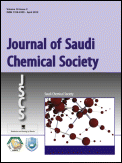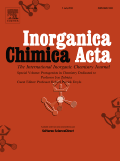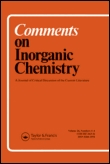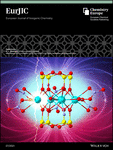
REVIEWS IN INORGANIC CHEMISTRY
metrics 2024
Your Essential Resource for Inorganic Advancements
Introduction
REVIEWS IN INORGANIC CHEMISTRY, published by Walter de Gruyter GmbH, is a distinguished academic journal that serves as a vital resource for researchers, professionals, and students within the field of inorganic chemistry. With its ISSN 0193-4929 and E-ISSN 2191-0227, this journal has made a significant impact on the discipline, holding a commendable Q2 ranking in the 2023 category of Inorganic Chemistry, placing it in the 81st percentile among its peers according to Scopus rankings. Continuously published since its inception, with converged years spanning from 1985 to 1990 and 1992 to 2024, it features comprehensive reviews encompassing the latest advancements, methodologies, and theoretical frameworks in the subject. Researchers will find IDEAL insights and valuable discussions that keep them abreast of trends and challenges in the domain, essential for driving innovation and collaboration. The journal’s commitment to quality and rigorous peer review highlights its importance in advancing inorganic chemistry research, making it an indispensable tool for academic excellence.
Metrics 2024
 0.61
0.61 4.10
4.10 3.30
3.30 29
29Metrics History
Rank 2024
Scopus
IF (Web Of Science)
JCI (Web Of Science)
Quartile History
Similar Journals

Journal of Saudi Chemical Society
Catalyzing Progress in the World of Chemistry.The Journal of Saudi Chemical Society, published by ELSEVIER, stands as a premier platform for advancing knowledge in the field of chemistry. Since its inception in 2009, this Open Access journal has garnered significant attention, securing a prestigious Q1 ranking in the Chemistry (miscellaneous) category for 2023, reflecting its position among the top journals in the discipline. With an impressive Scopus ranking of #66 out of 408 in General Chemistry, this journal boasts a commendable 83rd percentile, underscoring its impact and relevance in the global research community. The journal aims to disseminate high-quality research articles, reviews, and case studies, fostering innovation and collaboration among chemists and allied professionals. By enabling widespread access to cutting-edge research, the Journal of Saudi Chemical Society plays a crucial role in supporting the educational and professional development of students, researchers, and practitioners alike, making it an essential resource for anyone invested in the dynamic field of chemistry.

INORGANICA CHIMICA ACTA
Elevating Knowledge in Physical and Theoretical ChemistryINORGANICA CHIMICA ACTA is a distinguished journal published by Elsevier Science SA, focusing on the dynamic fields of inorganic chemistry, materials chemistry, and physical and theoretical chemistry. Established in 1967, the journal continues to contribute to the scientific community with a commitment to high-quality research and innovation, boasting a 2023 Scopus ranking that places it at the forefront of its category, including a notable rank of #25 out of 79 in Inorganic Chemistry. Researchers can access a wealth of knowledge through its assemblage of influential articles; though it does not offer open access, the journal remains a key resource in the Netherlands and beyond. With an impact factor reflective of its rigorous editorial standards and engagement, INORGANICA CHIMICA ACTA is essential for scholars and professionals seeking to deepen their understanding and advance their research in these interconnected scientific domains.

RUSSIAN JOURNAL OF INORGANIC CHEMISTRY
Pioneering Research in the World of InorganicsThe Russian Journal of Inorganic Chemistry is a distinguished publication that delves into the fundamental and applied aspects of inorganic chemistry. Published by MAIK Nauka/Interperiodica/Springer, this journal has established itself as a vital resource for researchers, professionals, and students alike, contributing significantly to the fields of Inorganic Chemistry, Materials Science, and Physical and Theoretical Chemistry. With an ISSN of 0036-0236 and an E-ISSN of 1531-8613, the journal is indexed for easy access and citation. Though the journal currently operates under a subscription model, its commitment to disseminating high-quality research and fostering scientific discourse remains steadfast. The journal has been maintaining a consistent record since its inception, and its positioning in the Q3 quartile across various chemistry categories in 2023 underscores its relevance in the academic community. As it continues through its converged years from 1996 to 2024, the Russian Journal of Inorganic Chemistry plays a pivotal role in enhancing the understanding and advancement of inorganic chemistry, making it an indispensable tool for anyone engaged in this dynamic field.

RUSSIAN JOURNAL OF COORDINATION CHEMISTRY
Pioneering Research in Metal-Organic RelationshipsThe Russian Journal of Coordination Chemistry, published by Pleiades Publishing Inc, stands as a significant contribution to the field of coordination chemistry, focusing on the intricate relationships between metal ions and organic molecules. With an ISSN of 1070-3284 and an E-ISSN of 1608-3318, this journal has been curating high-quality research since its inception in 1996. Though it currently does not offer open access, the journal plays a crucial role in disseminating innovative findings, evidenced by its Q3 ranking in both Chemical Engineering and Chemistry categories as of 2023. With Scopus rankings placing it in the 40th percentile among general chemistry and chemical engineering journals, it demonstrates a commitment to advancing knowledge in these vital areas. The journal invites researchers, professionals, and students alike to engage with its comprehensive articles that explore both theoretical and practical aspects of coordination chemistry, supporting the development of new applications and techniques within the field.

COMMENTS ON INORGANIC CHEMISTRY
Exploring the Depths of Inorganic ScienceCOMMENTS ON INORGANIC CHEMISTRY is a prestigious academic journal published by Taylor & Francis Ltd, specializing in the dynamic field of inorganic chemistry. With an impressive impact factor placing it in the Q1 category, this journal ranks #6 out of 79 in its field, reflecting its high influence and contribution to the discipline, with a remarkable percentile ranking of 93rd. Since its inception in 1981 and spanning publications until 2024, this journal serves as a crucial platform for researchers, professionals, and students to disseminate groundbreaking findings, review articles, and discussions on contemporary topics in inorganic chemistry. Although it is not an Open Access journal, the rigorous peer-review process ensures the publication of high-quality research. By bridging theoretical and practical aspects of inorganic chemistry, COMMENTS ON INORGANIC CHEMISTRY remains an essential resource for advancing knowledge and fostering innovation within the scientific community.

Inorganic and Nano-Metal Chemistry
Catalyzing Discoveries in Inorganic and Nano-Metal Science.Inorganic and Nano-Metal Chemistry is a premier journal published by Taylor & Francis Inc, focusing on innovative research and advancements in the fields of inorganic chemistry and nano-metal applications. With an increasing impact in the academic community, this journal has established itself within the Q3 category of both Inorganic Chemistry and Physical and Theoretical Chemistry as of 2023, reflecting its global recognition and influence. The journal is accessible as an Open Access publication, ensuring that research findings are freely available to a broad audience, promoting transparency and collaboration in scientific exploration. Based in the United Kingdom, Inorganic and Nano-Metal Chemistry aims to disseminate high-quality peer-reviewed articles that not only highlight fundamental studies but also push the boundaries of technological applications in areas such as catalysis, materials science, and nanotechnology. Researchers, professionals, and students will find this journal an invaluable resource for the latest developments and interdisciplinary insights in the ever-evolving landscape of inorganic and nano-metal chemistry.

Inorganics
Exploring the Frontiers of Inorganic ScienceInorganics is a vibrant, peer-reviewed Open Access journal dedicated to advancing the field of inorganic chemistry, published by MDPI since 2013. Based in Switzerland, this journal aims to provide a dynamic platform for researchers, professionals, and students to share groundbreaking findings, fostering collaboration and innovation within the global scientific community. With an impressive Q2 ranking in the category of Inorganic Chemistry as of 2023, Inorganics stands out as a significant conduit for high-quality research that spans a wide range of topics from coordination compounds to metal-organic frameworks. Its commitment to accessibility ensures that cutting-edge research can be accessed, utilized, and built upon by a diverse audience, thereby amplifying its impact. Join the conversation in Inorganics and contribute to the ever-evolving landscape of inorganic chemical research.

TRANSITION METAL CHEMISTRY
Fostering Insights into Materials and MetalsTransition Metal Chemistry is a distinguished journal published by Springer, focusing on the latest advancements in the field of inorganic chemistry, materials science, and metals and alloys. With an impressive publication history dating back to 1975, this journal serves as an essential platform for researchers and professionals seeking to explore the complexities and innovations in transition metal chemistry. Transition Metal Chemistry holds a Q4 ranking in Inorganic Chemistry and positions itself in Q3 within both Materials Chemistry and Metals and Alloys categories, highlighting its evolving influence in these domains. With a Scopus ranking of #41 in Inorganic Chemistry and #56 in Materials Science, it provides readers with valuable insights into research trends and discoveries. Although it does not offer open access, its rigorous peer-review process ensures that only the most impactful and validated studies are published. By bridging theoretical concepts and practical applications, Transition Metal Chemistry plays a pivotal role in advancing scientific knowledge, attracting a diverse audience of researchers, students, and industry professionals committed to unraveling the complexities of transition metals.

EUROPEAN JOURNAL OF INORGANIC CHEMISTRY
Fueling Collaboration and Innovation in Inorganic ChemistryThe EUROPEAN JOURNAL OF INORGANIC CHEMISTRY, published by WILEY-V C H VERLAG GMBH, is a premier peer-reviewed journal dedicated to advancing the field of inorganic chemistry. With an ISSN of 1434-1948 and an E-ISSN of 1099-0682, this journal has established itself as a key platform for the dissemination of innovative research, reviews, and features since its inception. As of 2023, it holds a respectable Q2 quartile ranking in the domain of inorganic chemistry, reflecting its influence and contribution to the scientific community—ranking #33 out of 79 in Scopus’ assessment and placing the journal in the 58th percentile. The journal encompasses a wide range of topics within inorganic chemistry, making it a valuable resource for researchers, professionals, and students alike. Although the journal does not currently offer open access, it remains an essential outlet for high-quality, impactful studies in inorganic chemistry, showcasing significant advancements and fostering collaboration among scholars globally.

JOURNAL OF CLUSTER SCIENCE
Unveiling Complexities in Cluster PhenomenaJOURNAL OF CLUSTER SCIENCE, published by SPRINGER/PLENUM PUBLISHERS, is a prominent and influential journal in the fields of Biochemistry, Chemistry, Condensed Matter Physics, and Materials Science. With an ISSN of 1040-7278 and E-ISSN of 1572-8862, this journal has been contributing to scientific discourse since its inception in 1990 and continues to publish cutting-edge research through 2024. It holds a respectable position in the academic landscape with its category quartiles indicating a Q3 ranking in Biochemistry and Q2 rankings in Chemistry, Condensed Matter Physics, and Materials Science as of 2023. The journal's noteworthy Scopus rankings further underscore its relevance, particularly a rank of #82 in Condensed Matter Physics, showcasing its impact and the quality of research disseminated. Although it does not currently offer open access options, it remains a key resource for researchers, professionals, and students who are invested in understanding the complexities of cluster science and its interdisciplinary applications.